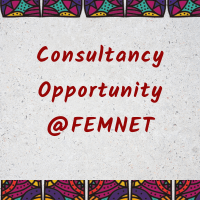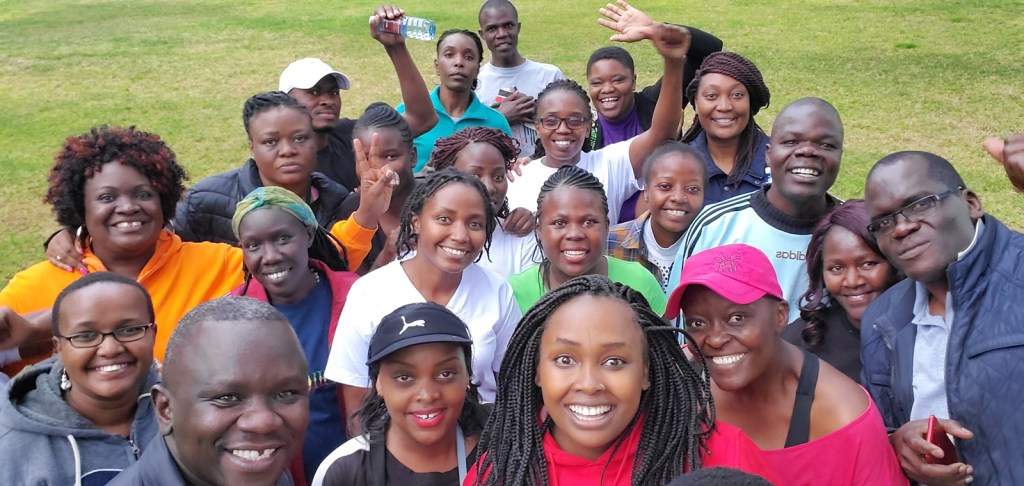Is the Kenyan Voter Ready to Implement the Gender Rule as Stipulated in the Constitution?
By Hannah Ondiek,
On 27th September 2012 I voted, yes I did. I cast my vote and I finally felt that my vote counted! It was a great feeling; the secrecy in the voting booth, my freedom of choice and the safety I felt through the whole process, was just amazing. Some of the questions in the voting booth were; would you vote in a woman, which woman would you vote for in Kenya and why? What is the biggest barrier to women running for office in Kenya? The questions were based on the Kenyan context, which in my opinion represent the situation of women in Africa where attitude towards women’s leadership is still biased.
All the participants at the monthly Gender Forum convened by Heinrich Boll Stiftung – HBF were welcomed into the Art exhibition themed “The Woman’s Vote” that was running simultaneously with the forum themed “Voter Outlook towards Leadership by Women.” The ‘Concept Art’ was a beautiful exhibition of women; young, old, rural, urban, Christian, Muslim all representing different counties in Kenya with messages around their necks spreading the message of women empowerment in the area of political participation, seeking to encourage voting of women and knowledge on the issue of women political leadership through a mock polling station and mock voting process, conceptualized by a young artist, Ms. Maryann Muthoni who was one of the panellists during the discussion.
The other panellists included Eunice Marimar, a politician from the South Rift region, Baraza Nyukuri a Gender Consultant, Hon. Rose Waruhiu, a former member of parliament, seasoned politician and a political aspirant in the March 4th 2013 elections, and Alice Wahome, Vice Chair at the Centre for Multi Party Democracy, the Chair – Kenya League of Women Voters and Advocates and a political aspirant in the March 4th 2013 elections. The enlightening discussions were moderated by Joe Ageyo a seasoned journalist in Kenya and beyond who made the session lively and interactive.
The issue of gender parity took centre stage as the panellists interacted with the participants who all had strong points regarding the issue. The session also discussed the voter’s attitude towards women leadership.
Articles in the Kenyan Constitution which sets the frame work according to the Law were mentioned including Article 81 (b) which states that not more than two-thirds of the members of elective public bodies shall be of the same gender, Article 177 on membership of the county assembly, Article 97 on membership of the national assembly, Article 27 on equality and freedom from discrimination, Article 98 on membership of the senate, and Article 88 (4) on the establishment of the Independent Electoral and Boundaries Commission – IEBC, specifically sub-section (i) on its role in regulating the amount of money that may be spent by or on behalf of a candidate or party in respect of any election.
It is clear that there is a lack of political will to include women in decision-making structures both at the national and local levels. This problem goes deep into our culture and socialization not only in Kenya but in Africa as a whole.
Hon. Waruhiu stated that it has been more than 40 years since independence and though women have contributed to the opulence of the country, they are still marginalized and underrepresented in leadership. The country has no choice left but to involve women. She urged women to have a clear agenda, wake up and be involved in politics noting that we represent 52% of the population. She reminded us that power will never be given, and we have to fight for it. She also advised women not to take power and remain “pretty faces” in parliament but to take on the policy issues that affect the country both now and for the future generations.
The Moderator, Mr. Ageyo asked if there is a deliberate attempt to lock women out, Ms. Wahome stated that we cannot continue discussing the question when article 27 and article 81 of the Constitution of Kenya give clear answers, she stated that we need to be discussing solutions.
The barriers to women political participation are economic, social, cultural, including fear of violence, alienation, lack of support especially from the family, women intimidation, lack of resources and a general negative attitude towards women leaders. Political parties also play a major role in this because that is the area where women representation starts. It was noted that there is power play, resource control in the political parties which are controlled by the men who make it hard for women members. There is apathy among voters who lack interest and concern on issues relating to women and surprisingly this also includes women who are sometimes viewed as their own enemies. Mrs. Marimar who represents women in the grassroots noted that rural women are viewed as housekeepers and home makers by their societies and the thought of them leading is ‘absurd’.
The Gender Consultant reiterated the feeling of most of the participants that we need to change the mentality that gender issues are women issues; he stated that it is a societal issue that should involve everyone. The law has only given us the frame work but we need to do extensive voter education. He also stated that we need to re- socialize the current socialization regarding women’s leadership.
Civic and voter education will be a tool to deal with the lack of education and sensitize citizens on their rights and privileges as citizens under the law.
The media can be a tool to either reinforce the negative stereotype towards women’s leadership or transform it since they have the platform and power of influence due to their wide reach. It should therefore be used by the right parties in order to spread the message of the need to empower women and support them in taking on leadership positions. We also need to ensure that article 27 and 81 are implemented.
The role of women will be to create conducive environments for other women and mentorship for younger women.
Joan Birika the Program Coordinator at HBF closed the session and urged women especially those seeking leadership positions to ensure the 3 A’s: Access to leadership, Agenda setting and Accountability.
Noting the situation in Africa where we currently have two female heads of state in Malawi and Liberia, a woman heading the African Union Commission (AUC), and several other key positions being held by women both in the public and private spheres, women are making notable strides in transforming and influencing leadership in the continent. It is imperative that we all support and encourage women’s leadership right from the local level, up to the highest position in our countries.
What is your attitude towards women leadership?
Stay connected with FEMNET; website, twitter, facebook
Related Tags
Related Posts
Desk Research on the African Continental Free Trade Area (AfCFTA) on Women and Trade
APPLICATION DEADLINE: 19th June 2020 The AfCFTA brings hope of a united integrated African market, however, although the AU
Learn MoreDesk Research on the African Continental Free Trade Area (AfCFTA) on Women and Trade – a Pan-African Feminist Analysis
APPLICATION DEADLINE: 19th June 2020 The AfCFTA brings hope of a united integrated African market, however, although the AU
Learn More

